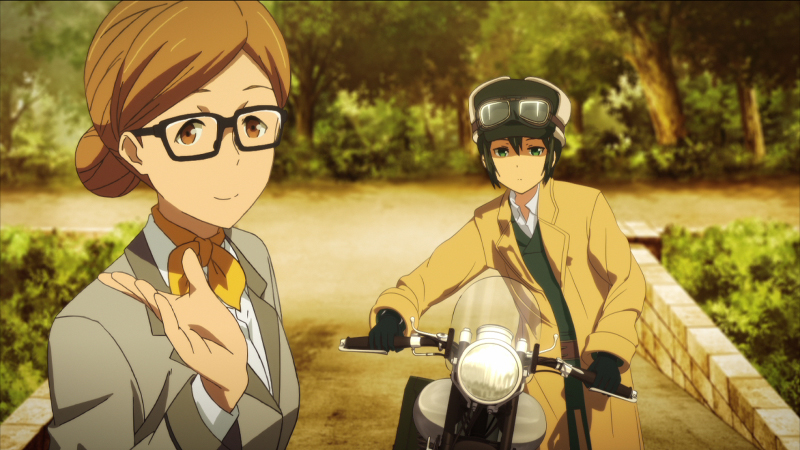The overall effect is one of bemused satisfaction

This week on Kino, our titular protagonist and her motorrad are front and center, telling two somewhat disconnected stories, the longer of the two called “Country of Liars.” Enjoyably, these stories are more in the vein of Episode 3, and despite still-somewhat-artless exposition, the overall effect is one of bemused satisfaction, rather than forlorn exasperation.
But we’re getting ahead of ourselves. The first of this week’s two stories begins so abruptly that I re-watched the episode on three different sites just to make sure my copy of the show wasn’t corrupt or missing an introductory segment. With zero context or explanation, we drop in on Kino and Hermes touring the old house of an honored, dead hero, who supposedly gave up a life of travel to save the nameless country through which Kino finds herself traveling. This segment is a shorter story than we’ve seen from the new Kino so far, and only gives us a brief meditation on the idea that the objects we love are best when used, not preserved, before Kino moves on to the main course of this week’s episode: “Country of Liars.”
In the second and longer story, Kino comes to know the sad story of a man who accosted her the moment she entered her most recent country. Breathlessly, the man asked for news of his lover, who supposedly left on a trip five years ago, and hasn’t been heard from since. Intrigued by his story, Kino asks the townsfolk for more details and is treated to a tale of political strife and loss. The story has, ultimately, a happy end…although certainly not in any traditional sense. Ultimately, the story offers a wistful pondering of the meaning of true love, and indeed how much “truth” really plays a part in the process.
While there are a few things to complain about in this episode, the tone overall is much more balanced and contemplative than last week—a slow and thoughtful counterpoint to the gunplay and monologuing of Ship Country, with nary a pistol in sight. While the writing is still a bit ham-fisted with its exposition, we at least get our customary dump from a citizen this time, not Hermes, giving the details a personal touch that the poor motorrad just can’t seem to bring to the story whenever he expounds. The moral, moreover, is a strong one this time—more thought-provoking than outright revelatory, and which left me, at least, thinking of those famous words “lord, what fools these mortals be.” This episode gives Kino a chance to do the things she does best: listen, travel, and silently judge everybody without letting on exactly what those judgments are. Perhaps they’re the same as our judgments? Projection, anyone?






